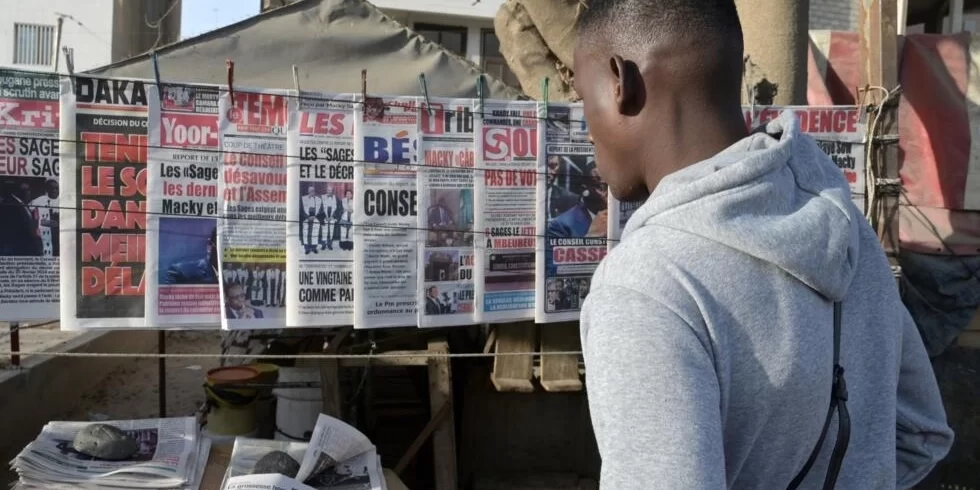On a recent Tuesday, Senegalese commuters were greeted with an unusual sight by Senegal media: newspapers with blank pages and a black cover bearing the words “journée sans presse” (“day without press”). This symbolic protest by Senegal’s national newspapers was a powerful statement against what they describe as shrinking media freedom under President Bassirou Diomaye Faye’s new government.
The Senegal Media, once a robust pillar of democracy, is now facing a severe crisis as the government tightens its grip on the press.
The Roots of the Protest: Government Crackdown on Senegal Media
The protest by the newspapers was triggered by a series of actions taken by President Faye’s government, which raised alarms about the future of press freedom in Senegal Media. The government has been accused of freezing the bank accounts of media companies and seizing their equipment over allegations of unpaid taxes.
While officials claim that these measures are necessary to combat financial mismanagement and embezzlement within the media industry, journalists and media organizations view them as an attempt to silence dissent and control the narrative.
A Dark Day for Senegal Media
The local Council of Press Distributors and Publishers (CDEPS) described the situation as “one of the darkest days” in the history of Senegal media. The blackout was a stark reminder of the growing threats to press freedom in a country that once prided itself on its democratic values. The protest highlighted the deep concerns within the media industry about the government’s increasing hostility toward independent journalism.
Not All Senegal Media Outlets Joined the Protest
While the blackout was widely supported by many newspapers, not all media outlets participated. Private newspaper Wal Fadjri criticized the blackout, calling it an “ugly scar on the cheek of our beautiful democracy.” Although Wal Fadjri acknowledged the crisis facing the press, they argued that a blackout should be a last resort, as it deprives readers of their right to information.
Radio stations largely rejected the boycott, but some private stations opted to play music instead of airing news. Meanwhile, private television channels like TFM, ITV, and 7 TV showed their support by featuring the protest’s slogan and image during their broadcasts.
The Role of President Faye’s Government
Concerns about media freedom under President Faye’s government emerged shortly after he took office in March. Faye, who came to power after defeating the ruling coalition’s candidate, has a history of opposing the previous government led by Macky Sall.
His rise to power was marked by massive protests against Sall’s decision to postpone elections, which critics saw as an attempt to cling to power. However, since taking office, Faye’s government has been accused of using similar tactics to suppress the media.
Declining Press Freedom In Senegal Media

Senegal’s press freedom has been on a downward trajectory in recent years. The country has slipped from 49th to 94th place on the Reporters Without Borders world press freedom index between 2021 and 2024. This decline reflects the increasing challenges faced by journalists, including arrests and attacks, media closures, and even internet shutdowns under the previous government. The current administration’s actions have only deepened concerns about the future of independent journalism in Senegal Media.
Calls for Action to Protect Press Freedom
Rights groups and media organizations are now urging President Faye to take immediate steps to protect press freedom in Senegal. They warn that the government’s actions risk undermining the country’s democratic foundations and eroding public trust in the media.
The recent protest by newspapers was a clear message that the media will not remain silent in the face of oppression. However, it also underscores the urgent need for reforms to ensure that the press can operate freely and without fear of retribution.
As Senegal Media grapples with these challenges, the future of its media hangs in the balance. The recent protest was a bold move by journalists to defend their rights, but it also highlights the deepening crisis facing the country’s democracy.
The world will be watching how President Faye responds to these concerns and whether he will take meaningful steps to restore press freedom in Senegal.





